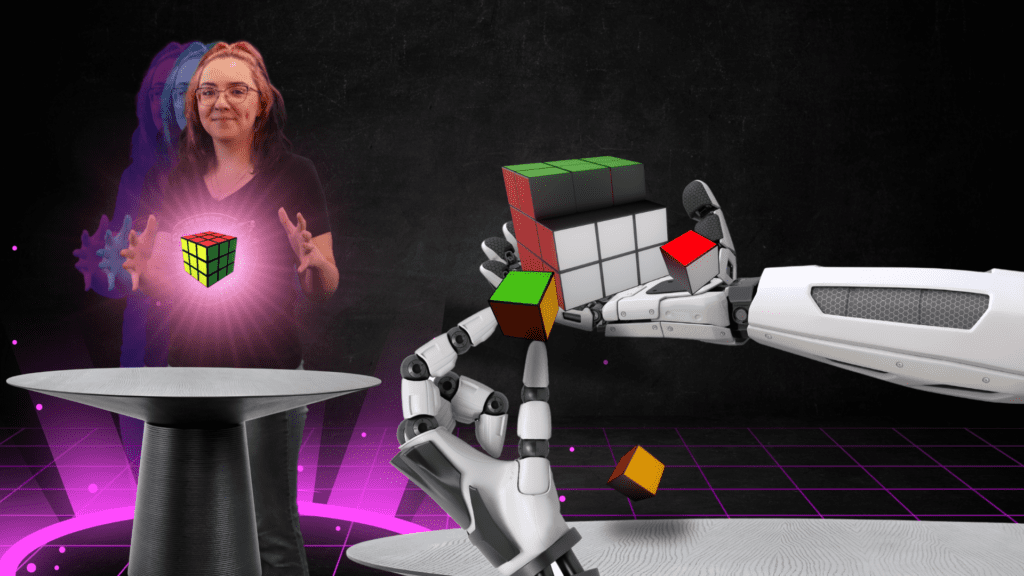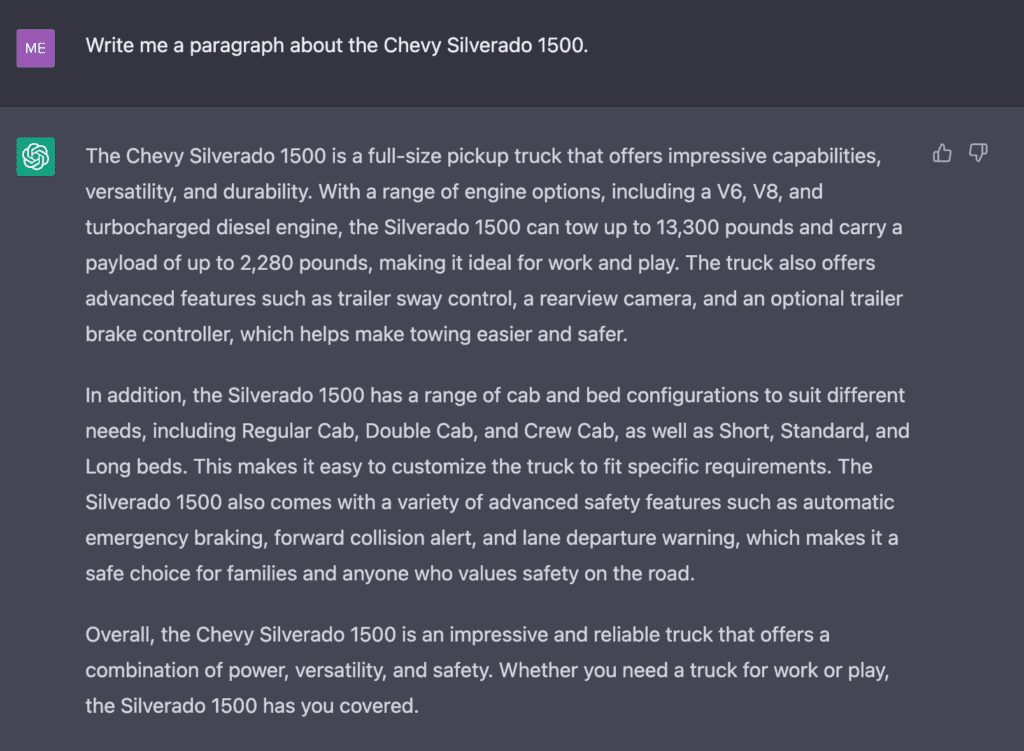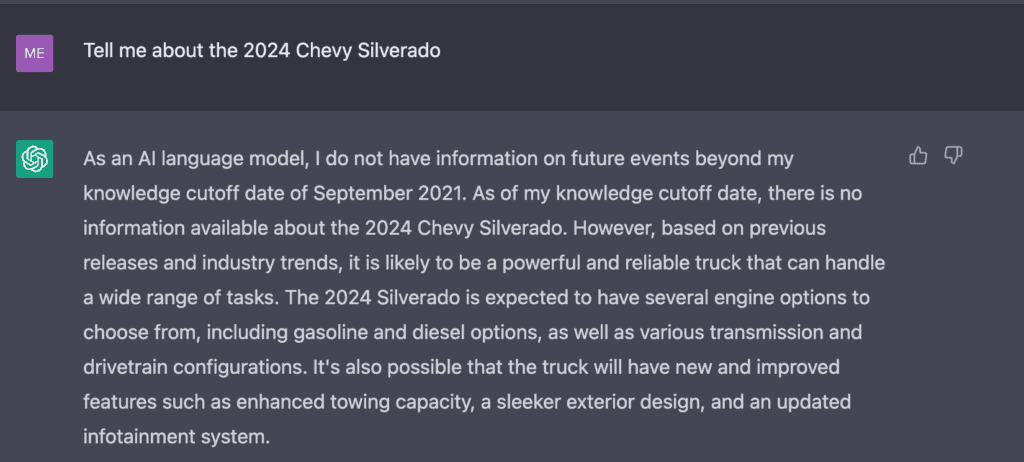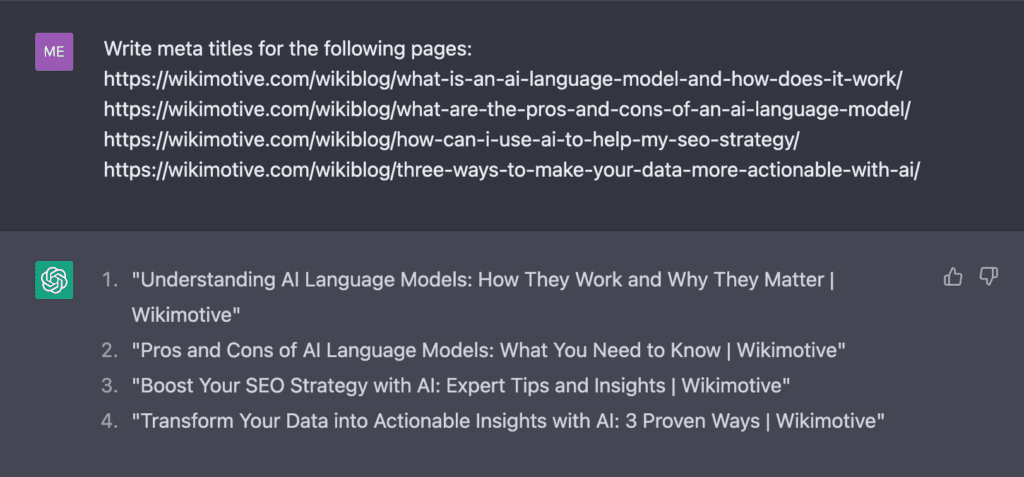
Some of you may be considering replacing your SEO provider with artificial intelligence (AI), thinking, “This could save me so much money!” While that may be true for your marketing budget, trading in an experienced SEO provider for AI is not without serious risks––some of which may outweigh any savings.
It goes without saying that AI does and will continue to have value in the modern world of digital marketing. Whether you are looking for a content outline, an Excel formula, or need help identifying patterns in your data, AI can be an extremely helpful tool. This doesn’t mean AI can replace your search engine optimization (SEO) provider, though. Let’s take a look at why that is.
The Heart of SEO: Humans
As defined, SEO is a combination of actions and work that you can take to optimize your website for search engines. However, the heart of SEO is optimizing for humans. You can rank #1 for all of the search terms in the world, but if your content isn’t useful to a person once they reach your site, they are likely going to immediately go back to the search engine results page (SERP) and look for something better. Even beyond that, as time goes on, search engines like Google are taking the human purpose for a search into consideration when ranking pages.
This all means that your site’s content should address real queries with useful and meaningful answers. Internal linking structures should follow the path a real person would hope to take by clicking on each link. Alt text, while another opportunity for keyword placement, should also always accurately describe an image to meet the needs of those who rely on screen readers. By focusing on your online audience and what they want and need, you will simultaneously meet the most important ranking factor that Google has today and encourage funneling through your site. Talk about a win-win!
AI Can’t Write Meaningful Content
What does all of this have to do with AI? Well, to be completely honest, AI simply cannot outperform humans when it comes to creating things for…humans. I encourage everyone to mess around with an AI tool, like ChatGPT. Ask it to write you a couple of paragraphs about something you know a lot about. Did it do a good job?
While playing with the tools myself, I have found that a lot of the content AI produces is great… as a starting point. Much of it is bland and does not have any sense of meaning behind it. For example, I asked ChatGPT 3.5 to write me a paragraph about the Chevy Silverado 1500:
For one, this is not “a” paragraph; it is three. I guess following directions isn’t ChatGPT’s strongest ability. Ignoring that, the content is very stiff. While it provides users with some quick information, that is all it is. There is no readability to it; you might as well just have a bulleted list of facts about a vehicle at that point. This could, however, serve as a good starting point for your own human-written content. Take some of the key points from this and expand on them to describe the benefits of this vehicle to your intended audience.
The other issue is, if you want to write about current events or offerings, you may be limited by an AI tool’s access to data. For example, ChatGPT only has information through September of 2021. As professionals in the automotive industry, this is very prohibitive in terms of content. See here:
Due to its lack of knowledge about current-day offerings, you cannot use ChatGPT to write content about 2024 vehicles. Therefore, even if you could figure out a way to get high-quality, human-focused content out of AI, you wouldn’t be able to talk about any recent topics. When it comes down to it, AI simply cannot produce content the way that humans can. You cannot replace human writers with AI.
AI Can’t Do Technical SEO
There is more to SEO than having a solid content marketing strategy in place, though. This content needs to be fully optimized with keyword inclusion (not stuffing), internal linking, alt tags for the images, and well-written meta titles. These are things AI cannot do.
For example, choosing the right anchor text for an internal link takes thinking like both a search engine and a human at the same time. Both “what signal does this send to Google about the linked page” and “what page would a human want to reach by clicking here” need to be considered. AI is not capable of going through that type of thought process; this requires a true, human SEO professional.
AI cannot even be used to help expedite the process of some technical SEO work. There are tasks, such as rewriting meta titles, that take more effort to prompt AI to do the right thing than it would take to just do the job yourself. Remember when I said that AI’s strengths don’t necessarily include following your directions perfectly?
To show you what I mean, I prompted ChatGPT to write meta titles for four of the blog posts from our website:
Now, immediately, I need changes to be made here. While not inherently wrong, our standard practice does not include using the company name in meta titles, as this uses up space that could be better utilized with search terms. With that, I need to have ChatGPT rewrite those to fit our standard:
When prompted to rewrite the titles without “Wikimotive” in them, a new issue occurred: pixel limits. Meta titles are limited to 600 pixels (about 60-65 characters). Anything longer than that will be cut off, and anything significantly shorter than that is simply wasting space. The last title in this list is 72 characters––the end will be cut off. The third title in this list is only 49 characters––there is a lot of wasted space that could be optimized.
Already, I have spent much too long trying to get this tool to write my meta titles that would’ve taken only a couple of minutes to write and upload to the website myself. This is only one example of how AI can actually overcomplicate some SEO tasks. Don’t get me wrong, as an SEO professional, using AI has helped to speed up numerous processes, but there are quirks in every use and some things you cannot use it for at all.
When push comes to shove, AI has the ability to be a super useful SEO tool. But will it replace actual SEO providers? Certainly not today or tomorrow, or even any time in the near future.
The Relationship Between AI Tools & SEO
I’ve touched base on a few things AI has the chance at attempting to take over from SEO professionals, but it’s important to note that there are plenty of tasks that can’t even begin to be addressed by tools like ChatGPT, such as:
- Sitemap Analysis
- User Experience
- Internal Linking Structures
- Meaningful Content Mapping
There are so many essential pieces of SEO strategy that will go missing if you try to replace your SEO provider with AI. So, my advice? Simply don’t do it. That said, SEO providers utilizing AI should replace those who are not. This isn’t because the best SEO professionals are going to have AI do everything for them; it is because the best SEO professionals are going to utilize AI to make their jobs more efficient.
With the ability to sort through information quickly, identify patterns, and identify and give you Excel formulas that can help you do this on your own, AI is extremely helpful when it comes to data analysis. It can also help with content outlines, keyword research, and topic ideas. We have talked all about this in previous articles in our Artificial Intelligence Series, which you should check out if you want to learn more about the relationship between SEO and AI.
Here at Wikimotive, we have begun incorporating AI into our work not only so that we can best perform for our clients but also so that we can tell you all about it. While we are absolutely unapologetically human and believe that the human touch belongs in every SEO strategy, we are also dedicated to trying new technologies and learning how to better our work within new spaces.
So, what are you waiting for? Contact us today to learn more about how we are using AI to help you crush your competition.



